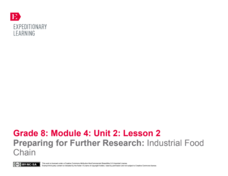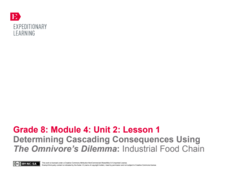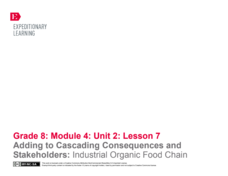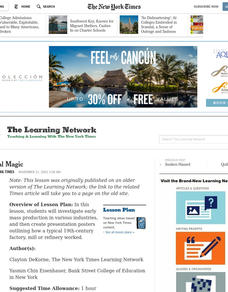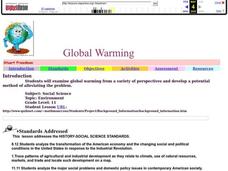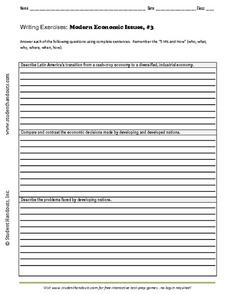Curated OER
The New England Fishing Industry:Sea Changes in a Community
Explore New England's economic and cultural past and possible issues New Englanders will face in the future. Middle and high schoolers research the fishing industry and the need for regulation. They analyze the topography of New England...
Curated OER
Industrialization of the American Landscape - Language Arts
Students examine poetry , editorials, and other writings during the Industrial Revolution. They perform a "chalk talk" to explain perceptions, ideas and observations of the working world. Students write poetry and essays modeled after...
EngageNY
Adding to Cascading Consequences and Stakeholders: Industrial Food Chain
Young researchers create a class Cascading Consequences chart to see how the industrial food chain affects people, animals, and the environment. They also work in teams to complete a Stakeholders chart for the industrial food chain model...
EngageNY
Preparing for Further Research: Industrial Food Chain
Using an informative resource, pupils discover how to write research questions that are focused, answerable, and relevant. Scholars evaluate resources about the industrial food chain from Michael Pollan's The Omnivore's Dilemma and then...
Curated OER
Fort Wayne's Industrial Girls
Eighth graders explore what life was like for Fort Wayne's "industrial girls." In this industrialization lesson, 8th graders discuss the conditions that the Indiana factory girls worked in as well as their backgrounds. Students also...
Curated OER
Technology as Change: The Atlantic Canada Fishery
A wonderfully constructed series of lessons on the history of the fishing industry in Canada. They discuss what they already know about the methods and technology used in the fishing industry past and present, create a research report...
Curated OER
Writing Exercises: Economic and Social Revolutions III
With great advancements come great changes! Young historians examine economic and social change occurring after the start of the Industrial Revolution. They respond to three questions regarding the beginning of the Revolution, the impact...
Curated OER
The Industrial Age in America: Robber Barons and Captains of Industry
Young scholars define terms "robber baron" and "captain of industry," list positive and negative actions of one or more captains of industry/robber barons, and take and support stand as to whether particular financier/industrialist is or...
EngageNY
Determining Cascading Consequences Using The Omnivore’s Dilemma: Industrial Organic Food Chain
Organic versus conventional farming: which option is best? Pupils use Michael Pollan's The Omnivore's Dilemma to determine the cascading consequences of the industrial organic food chain. They work in research teams to create an...
EngageNY
Determining Cascading Consequences Using The Omnivore’s Dilemma: Industrial Food Chain
Which of Michael Pollan's four food chains from his book The Omnivore's Dilemma would best feed everyone in the United States? Using a thought-provoking resource, scholars learn how to create a Cascading Consequences chart to answer the...
EngageNY
Using Search Terms for Further Research: Industrial Organic Food Chain
Class members conduct independent research to continue examining the consequences of the industrial organic food chain from Michael Pollan's The Omnivore's Dilemma. Pupils learn about source credibility and effective search terms, then...
EngageNY
Adding to Cascading Consequences and Stakeholders: Industrial Organic Food Chain
Researchers continue determining the effects of the industrial organic food chain that Michael Pollan describes in The Omnivore's Dilemma. In teams, pupils add to their Cascading Consequences charts and complete Stakeholders charts based...
EngageNY
Reading for Gist and Answering Text-Dependent Questions: Industrial Food Chain
Where do humans fall on the food chain? Scholars read about the Industrial Food Chain in The Omnivore’s Dilemma sections. They use word catchers to record unfamiliar words as they read and place sticky notes in the margins to annotate...
EngageNY
Forming a Research-Based Claim: Stakeholder Chart on Better Industrial Water Management
It's time to stake a claim! Working with partners, scholars create stakeholder charts for better industrial management of water. As they complete the chart, pupils consider an option for managing water more sustainably, identify...
EngageNY
End of Unit 2 Assessment, Part 1B: Fishbowl on Better Use of Water in Industry
Listen up, it's time for a Fishbowl discussion! Scholars continue their discussions about water management in industry and agriculture. After hearing both sides of the debate, pupils complete graphic organizers, deciding which sector is...
Voice of America
Henry Ford, 1863-1947: He Revolutionized the Auto Industry
How did Henry Ford change the world? One word: automobile. After reading a two-page passage about Henry Ford's contributions to society with the invention of the automobile, readers respond to a series of 10 reading comprehension...
Curated OER
Industrial Times
Fourth graders follow a journalistic theme to find out about the causes and effects of the Industrial Revolution. Students engage in a variety of activities in this unit.
Curated OER
Writer's Workshop for ESL Students: Refuting an Argument
Thorough and well-organized, this lesson plan helps pupils to weigh, build, and refute an argument (the latter of which is featured here; the first two parts are linked within the resource). Given a simplified argument and counter...
Curated OER
Industrial Light and Magic
Students investigate early mass production in various industries, and then create presentation posters outlining how a typical 19th-century factory, mill or refinery worked.
Curated OER
What is the Dow?
Students study about the most widely reported stock market indicator by the news media, the Dow or DJIA, short for Dow Jones Industrial Average. They complete a table that divides these 30 companies into different industry groups.
Curated OER
Global Warming
A series of independent learning activities teaches learners about global warming as it relates to economics and industrialization. The culminating project requires them to create a multimedia presentation identifying the problems,...
Curated OER
We've Gotcha Covered: The Iowa Insurance Story
Analyze the relationship between financial risks and the growth of the insurance industry in Iowa. Learners work in groups to analyze the major catastrophic events that occurred in their community. Several worksheets are included.
Curated OER
Writing Exercises: Russian Revolution, #2
Why did communism develop in an unindustrialized Russia? What human rights were violated under Joseph Stalin? And, how did the Soviet Union become industrialized? These are the writing prompts your class will work to answer with complete...
Curated OER
Writing Exercises: Modern Economic Issues, #3
Developing nations tend to deal with economic issues differently than developed nations. Learners explore modern economic issues such as the Latin American economy, cash-crop economy, and industrial economy by responding to three...
Other popular searches
- Fisheries
- Radio Industry
- "Technology" Industry
- Auto Industry
- Music Industry
- Cattle Industry
- Automotive Industry
- Automobile Industry
- Film Industry
- Fishing Industry
- Aviation Industry
- Forest Industry





